2022 Autumn Symposium on “Supports for Knowledge”
April 7, 2022 in Announcements, Conference, Conference Announcement, Manuscript Studies
2022 RGME Spring and Autumn Symposia
on “Structured Knowledge”
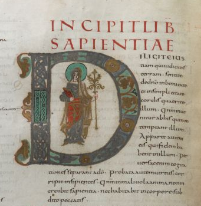
© British Library Board, London, British Library, Add. MS 1546, folio 262v, detail. Opening of the Book of Sapientia (“Wisdom”).
2 of 2: Autumn Symposium
“Supports for Knowledge”
Saturday, 15 October 2022
Online
9:00 am – 5:30 pm EDT with Sessions, Discussion, and Breaks
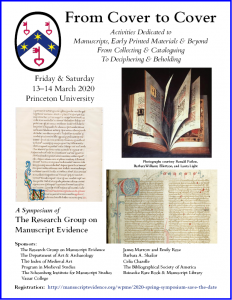
2020 Spring Symposium Poster 2
[Posted on 5 April 2022 with updates]
In 2022, the Research Group returns to our series of Symposia (formerly held in person). The series underwent an interruption with the cancelled 2020 Spring Symposium, “From Cover to Cover”. See its record in the illustrated Program Booklet, with Abstracts of the planned presentations and workshops. Its core and its promise inspire this renewal.
This year, each Symposium in the pair is designed as a one-day event, with sessions and workshops of about 1 and 1/2 hours, giving scope for discussion. The Spring Symposium was held online by Zoom. The Autumn Symposium would be held online, but, conditions permitting, it might be hybrid, that is, partly in person, as well as online. See 2022 Spring and Autumn Symposia.
- Structures of Knowledge (Spring)
- Supports for Knowledge (Autumn)
These events, by request, flow in addition to — and partly from — our other activities during the year:
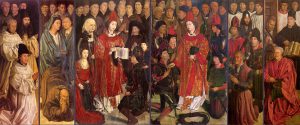
Lisbon, Museu Nacional de Arte Antiga: The mid 15th-century Saint Vincent Panels, attributed to Nuno Gonçalves. Image via Creative Commons.
1) Continuing Episodes in the online series of The Research Group Speaks (2021–)
2) Our four sponsored and co-sponsored Congress Sessions at the 57th International Congress on Medieval Studies (online) in May
- https://manuscriptevidence.org/wpme/2022-international-congress-on-medieval-studies-program
(Abstracts of the Papers are included).
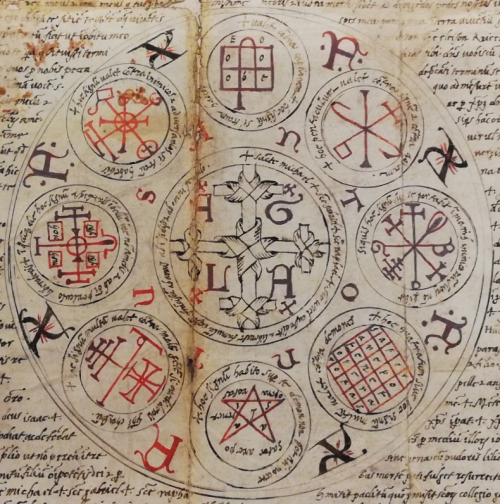
© The British Library Board. Additional MS 15505, folio 22r. Italian, early 16th century. Circular diagram with coloured drawings of nine magical seals, as a textual amulet with charms against diseases.
Structured Knowledge (Parts I and II)
The interlinked pair of Spring and Autumn Symposia examine themes of Structured Knowledge.
Some proposed presentations at these Symposia offer refreshed materials which had been planned for the cancelled 2020 Spring Symposium.
- See https://manuscriptevidence.
org/wpme/2020-spring- symposium-save-the-date, with a published Program Booklet including illustrations and Abstracts.
Part I: Spring Symposium (Saturday, 2 April 2022)
on “Structures of Knowledge”
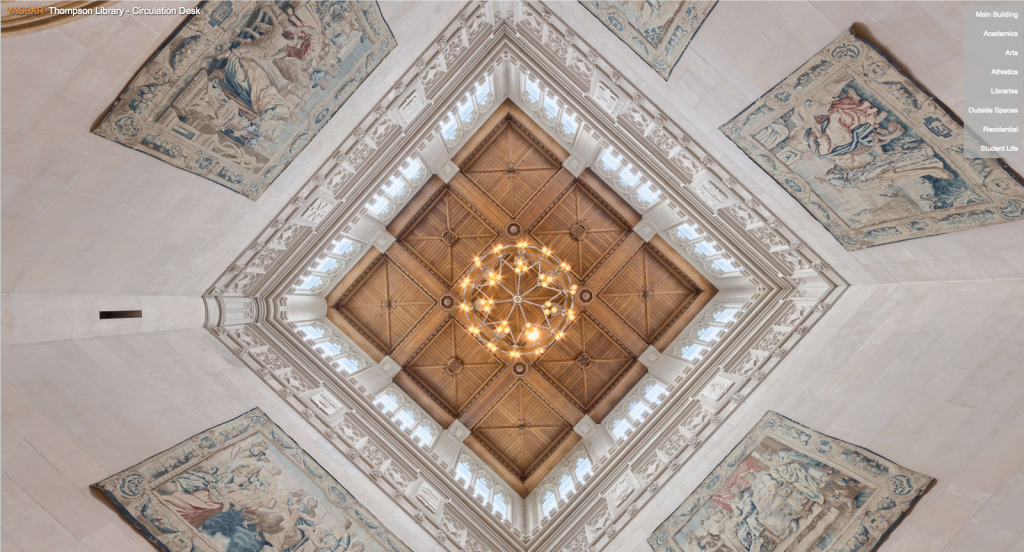
Vassar College, Frederick Thompson Memorial Library, Entry, Ceiling and Gobelin Tapestry Series.
Part II: Autumn Symposium (Saturday, 15 October 2022)
on “Supports for Knowledge”
For link to register for the Symposium, see below.
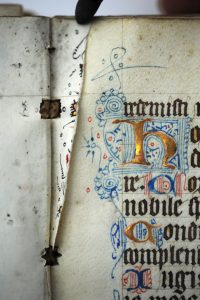
Private Collection, Book of Hours, Decorated Initial and Stub from Despoiled Leaf. Photography Mildred Budny.
Sessions include approaches to books, libraries, catalogues, and databases; case studies, projects, and work-in-progress and projects examining individual original sources or groups of them; the history, uses, and reuses of books and their materials; issues, opportunities, and successes in research and teaching; and more.
Speakers, Respondents, and Presiders:
Christine E. Bachman, Linde M. Brocato, Mildred Budny, William H. Campbell, Katharine C. Chandler, Connor Chinoy, Barbara Williams Ellertson, Hannah Goeselt, Justin Hastings, Thomas E. Hill, Zoey Kambour, Jennifer Larson, Amber McAlister, Caley Macaulay, Andrew Moore, David Porreca, Jaclyn Reed, Jessica L. Savage, Derek Shank, Kate Schmidt, David W. Sorenson, and N. Kıvılcım Yavuz.
Timetable
Session 1. 9:00–10:30 am EDT by Zoom
Coffee Break. 10:30–10:45 am
Session 2. 10:45 am – 12:15 pm
Lunch Break. 12:15–1:15 pm
Session 3. 1:15–2:45 pm
Tea Break. 2:45–3:00 pm
Session 4. 3:00–4:30 pm
Break. 4:30–4:45 pm
Session 5. 4:45–5:30 pm EDT
Closing Keynote Presentation, Discussion, and Concluding Remarks
Sessions
1. “Teaching with (and through) Manuscripts, Part II”
— Part II in our series on these subjects, building upon Part I in the Spring Symposium.
— including presentations by:
Caley McArthur and Andrew Moore, representatives of the Team from the DRAGEN Lab, at the University of Waterloo, reporting on “initiatives in our lab to train students, both undergraduate and graduate, in medieval paleography”; and
William H. Campbell and his colleagues and students, Amber McAlister, Kate Schmidt, and Connor Chinoy, on the experience of teaching an undergraduate course this summer using the Les Enluminures Manuscripts in the Curriculum program at the University of Pittsburgh-Greensburg.
2. “Catalogs, Metadata, and Databases, Continued (Part III)”
— Part III in our series on these subjects, building upon our Roundtable in February on Catalogs, Metadata, and Databases, Part I and the Session on “Catalogs, Metadata, and Databases, Part II” in the Spring Symposium.
— including presentations by:
Jessica L. Savage on “Cataloguing Manuscript Iconography between Digital Covers at the Index of Medieval Art”;
Katharine C. Chandler on “Manuscripts from Print: The Schwenkfelders and their Dangerous Books”; and
Barbara Williams Ellertson on “A Painter, a Printer, and a Search for Shared Exemplars”
(focusing upon Giovanni Bellini’s painting of Saint Benedict and his Book);
with a response by David Porreca on “My $0.02 Worth”.
For this Session, Jessica Savage and Barbara Williams Ellertson revive, update, and expand the presentations which they had prepared for the 2020 Spring Symposium, which had to be cancelled; their Abstracts then appear in its freely-available Program Booklet, published as a souvenir or token of the intentions for the event.
For the subject of this series, see the Links of Interest (Catalogs, Metadata, and Databases: A Handlist of Links), for which suggestions and additions are welcome.
3. “The Living Library (Part II)”
Part II in the series, building upon Part I at the Spring Symposium
— including
Christine E. Bachman on “Unbound, Dispersed, Resewn: The Flexible Codex in Eighth-Century Northwestern Europe”;
Zoey Kambour on interactions between scribes, readers, and text in a copy of the Decretals of Pope Gregory IX at the University of Oregon;
David Porreca‘s presentation which had been planned for our Spring Symposium: “The Warburg Institute Library: Where Idiosyncracy Meets User-Friendliness”; and
Thomas E. Hill‘s response on systems of structuring libraries in Germany from the Baroque and Enlightenment periods.
4. “Hybrid Books (Part I)”
Part I in a continuing series
— including
Hannah Goeselt on “Structures of Art and Scripture in Otto Ege’s ‘Cambridge Bible’ (Ege Manuscript 6)”;
Jennifer Larson‘s presentation of selected examples of types of “Hybrid Books” in her collection of miniature books;
Linde M. Brocato‘s demonstration, using some of Jennifer’s examples, of how to catalog such cases; and
N. Kıvılcım Yavuz‘s response on decision-making processes involved in producing codices composed of handwritten and printed components, with a proposal of ways of differentiating among different types of hybrid codices.
[Note: Depending upon variable work timetables, David W. Sorenson might be able to attend at some point during the day to present preliminary findings on “A Jain MS of the Seventeenth Century on Imported Watermarked Paper”.]
Closing Keynote Presentation
Linde M. Brocato
“Hybrid Books: Fragments and Compilatio, Structure and Heuristic in Richard Twiss’ Farrago”
[For glimpses of this book, see our blogpost called “I Was Here”.]
“In these reflections, I will bring together many of the strands of thinking we have all worked to weave together in the symposium.”
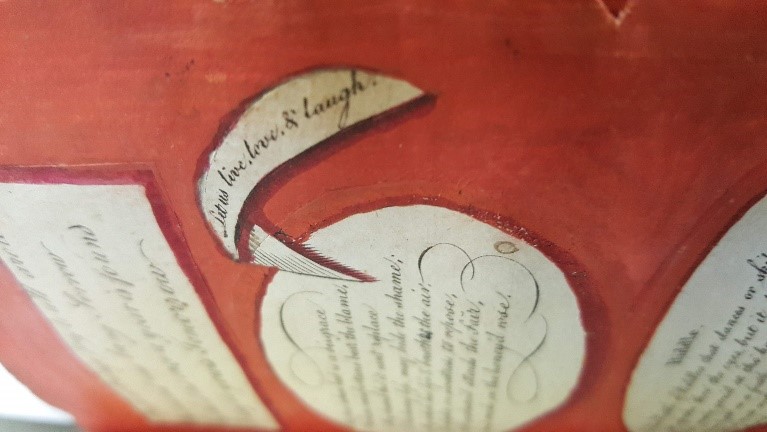
Richard Twiss, Farrago, held in the Unversity of Miami Special Collections, Artists’ Books Collection. Sidelong View. Photograph Linde M. Brocato.
Concluding Remarks
Mildred Budny
“Structured Knowledge, Structures of Knowledge, and Supports for Knowledge: A Framework for the RGME Year 2022”
*****
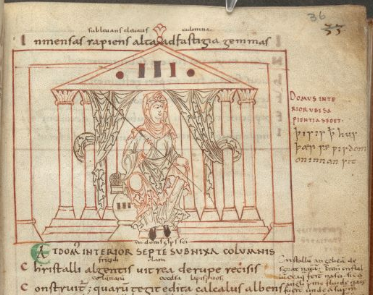
© British Library Board, London, British Library, Cotton MS Cleopatra C. viii, folio 36r, top: Sapientia in her Temple. Prudentius, Psychomachia, in a Canterbury copy of the late tenth or early eleventh century.
The Schedule
For details see the 2022 Autumn Symposium Program.
Registration
Please register for the Symposium. Space is limited. Visit 2022 Autumn Symposium Registration.
Questions? Contact director@manuscriptevidence.org.
*****
Other Activities
Besides the 2022 Spring and Autumn Symposia , the Research Group
- sponsors and co-sponsors Sessions at the ICMS (see our 2022 Congress Program and 2023 International Congress on Medieval Studies Preparations)
- prepares more online Episodes for The Research Group Speaks: The Series
- plans events for 2023, including online Open Business Meetings and a pair of Symposia (Spring and Autumn)
- prepares publications in various forms from these events, research work, discoveries, and divers materials, including our blog on Manuscript Studies (see its Contents List) and more Research Booklets.
Suggestion Box
Do you have suggestions for subjects for our events, or offers to participate? Please let us know.
If you wish to join our events, please contact director@manuscriptevidence.org.
For updates, watch this space, see 2022 Spring and Autumn Symposia and The Research Group Speaks: The Series; and visit our FaceBook Page and Twitter Feed (@rgme_mss).

Floral Motif as Lower Border in a Book of Hours. Photography Mildred Budny.
We invite you to donate to our nonprofit educational mission. Donations may be tax-deductible. We welcome donations in funds and in kind:
Please leave your Comments below , Contact Us, and visit our FaceBook Page and Twitter Feed (@rgme_mss). We look forward to hearing from you.

© British Library Board, London, British Library, Add. MS 1546, folio 262v, detail. Opening of the Book of Sapientia (“Wisdom”) in the Moutier-Grandval Bible, an imposing Carolingian manuscript of the Latin Vulgate Bible.
*****
